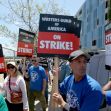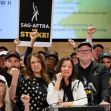The union representing more than 160,000 actors officially declared a strike against Hollywood producers last week, joining the industry’s writers in challenging the state of affairs in the streaming era. The strike’s effects go beyond television and film actors, as SAG-AFTRA issued specific rules pertaining to social media influencers.
It may surprise some to learn that “influencers” can become SAG-AFTRA members, even without acting in TV or film. SAG has executed an Influencer Agreement, under which certain influencers can tie their content to a union contract. Under the agreement, influencers are treated more like advertising agencies, creating ad content for studios. Many studios have begun leaning on popular TikTokers and other social media stars to gin up viral marketing for new projects. Now that the union is on strike, however, the influencer-studio partnership is on hold like everything else.
This week, SAG issued specific strike guidance for influencers. According to the union, influencers may not release paid promotional content for struck work. That means influencers are prohibited from accepting any new work for promotion of struck companies (i.e., AMPTP producers). Influencers have been cautioned against publishing promotional content for struck work or even posting about attending premiers for struck companies, although the union’s guidance makes clear that influencers who are “already under contract to promote struck work” are at liberty to “fulfill their work obligation.” Influencers are, however, free to continue pursuing other brand deals and promotional work covered by the Influencer Agreement.
The union’s statement on influencers has raised some eyebrows. Influencers have been told to “refrain from posting on social media about any struck work regardless of whether they are posting organically or in a paid capacity.” Moreover, non-union influencers who perform “covered work or services for a struck company” might be forever barred from joining SAG in the future. The rules have some worrying that any social media post about a current or upcoming movie or show--even if it’s just an unpaid fan post, rather than paid promotional content--could lead to a ban on SAG membership.
Limiting the conduct of nonunion members is standard fare for any labor strike. While SAG can’t directly discipline nonunion actors, for example, it can label any actors who cross the picket line to work for struck companies as “scabs” and refuse their admission into the union. SAG is essentially declaring that the same rule applies to nonunion influencers. What has some feathers ruffled is the line between crossing the picket line and engaging in normal, private social media conduct.
The National Labor Relations Act (NLRA) empowers workers to strike. It also prohibits employer retaliation for collective bargaining efforts. Labor unions are granted significant free speech rights in order to protect the power of collective bargaining.
Nonunion members, on the other hand, are not afforded any special free speech rights with regard to the union. Unions cannot deny membership based on discrimination against a protected class (race, sexual orientation, religion, etc.), but they are free to deny membership otherwise. If SAG decides that an influencer’s private social media post leaned too far into promoting an AMPTP production, they could decide to bar that person from joining the union, just as they would bar a nonunion actor for crossing the picket line.
Notably, journalists are not considered influencers and can continue to freely cover big-ticket blockbusters. SAG has also refrained from calling a consumer boycott, so TV watchers and filmgoers should feel free to express their solidarity with writers and actors while still enjoying their favorite summer content.






